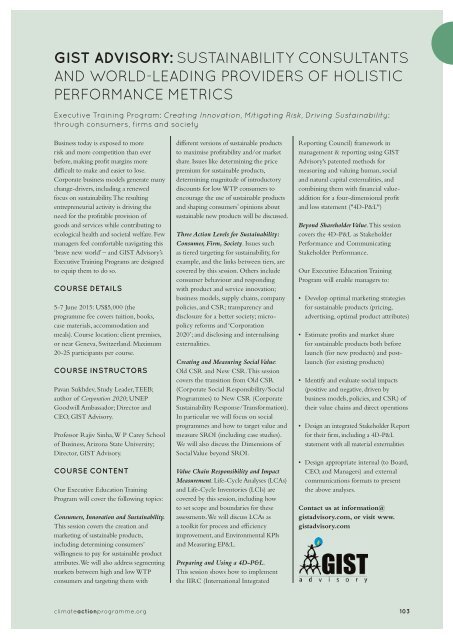Climate Action 2014-2015
You also want an ePaper? Increase the reach of your titles
YUMPU automatically turns print PDFs into web optimized ePapers that Google loves.
GIST ADVISORY: SUSTAINABILITY CONSULTANTS<br />
AND WORLD-LEADING PROVIDERS OF HOLISTIC<br />
PERFORMANCE METRICS<br />
Executive Training Program: Creating Innovation, Mitigating Risk, Driving Sustainability:<br />
through consumers, firms and society<br />
Business today is exposed to more<br />
risk and more competition than ever<br />
before, making profit margins more<br />
difficult to make and easier to lose.<br />
Corporate business models generate many<br />
change-drivers, including a renewed<br />
focus on sustainability. The resulting<br />
entrepreneurial activity is driving the<br />
need for the profitable provision of<br />
goods and services while contributing to<br />
ecological health and societal welfare. Few<br />
managers feel comfortable navigating this<br />
‘brave new world’ – and GIST Advisory’s<br />
Executive Training Programs are designed<br />
to equip them to do so.<br />
COURSE DETAILS<br />
5-7 June <strong>2015</strong>: US$5,000 (the<br />
programme fee covers tuition, books,<br />
case materials, accommodation and<br />
meals). Course location: client premises,<br />
or near Geneva, Switzerland. Maximum<br />
20-25 participants per course.<br />
COURSE INSTRUCTORS<br />
Pavan Sukhdev, Study Leader, TEEB;<br />
author of Corporation 2020; UNEP<br />
Goodwill Ambassador; Director and<br />
CEO, GIST Advisory.<br />
Professor Rajiv Sinha, W P Carey School<br />
of Business, Arizona State University;<br />
Director, GIST Advisory.<br />
COURSE CONTENT<br />
Our Executive Education Training<br />
Program will cover the following topics:<br />
Consumers, Innovation and Sustainability.<br />
This session covers the creation and<br />
marketing of sustainable products,<br />
including determining consumers’<br />
willingness to pay for sustainable product<br />
attributes. We will also address segmenting<br />
markets between high and low WTP<br />
consumers and targeting them with<br />
different versions of sustainable products<br />
to maximise profitability and/or market<br />
share. Issues like determining the price<br />
premium for sustainable products,<br />
determining magnitude of introductory<br />
discounts for low WTP consumers to<br />
encourage the use of sustainable products<br />
and shaping consumers’ opinions about<br />
sustainable new products will be discussed.<br />
Three <strong>Action</strong> Levels for Sustainability:<br />
Consumer, Firm, Society. Issues such<br />
as tiered targeting for sustainability, for<br />
example, and the links between tiers, are<br />
covered by this session. Others include<br />
consumer behaviour and responding<br />
with product and service innovation;<br />
business models, supply chains, company<br />
policies, and CSR; transparency and<br />
disclosure for a better society; micropolicy<br />
reforms and ‘Corporation<br />
2020’; and disclosing and internalising<br />
externalities.<br />
Creating and Measuring Social Value:<br />
Old CSR and New CSR. This session<br />
covers the transition from Old CSR<br />
(Corporate Social Responsibility/Social<br />
Programmes) to New CSR (Corporate<br />
Sustainability Response/Transformation).<br />
In particular we will focus on social<br />
programmes and how to target value and<br />
measure SROI (including case studies).<br />
We will also discuss the Dimensions of<br />
Social Value beyond SROI.<br />
Value Chain Responsibility and Impact<br />
Measurement. Life-Cycle Analyses (LCAs)<br />
and Life-Cycle Inventories (LCIs) are<br />
covered by this session, including how<br />
to set scope and boundaries for these<br />
assessments. We will discuss LCAs as<br />
a toolkit for process and efficiency<br />
improvement, and Environmental KPIs<br />
and Measuring EP&L.<br />
Preparing and Using a 4D-P&L.<br />
This session shows how to implement<br />
the IIRC (International Integrated<br />
Reporting Council) framework in<br />
management & reporting using GIST<br />
Advisory's patented methods for<br />
measuring and valuing human, social<br />
and natural capital externalities, and<br />
combining them with financial valueaddition<br />
for a four-dimensional profit<br />
and loss statement ("4D-P&L")<br />
Beyond Shareholder Value. This session<br />
covers the 4D-P&L as Stakeholder<br />
Performance and Communicating<br />
Stakeholder Performance.<br />
Our Executive Education Training<br />
Program will enable managers to:<br />
Develop optimal marketing strategies<br />
for sustainable products (pricing,<br />
advertising, optimal product attributes)<br />
Estimate profits and market share<br />
for sustainable products both before<br />
launch (for new products) and postlaunch<br />
(for existing products)<br />
Identify and evaluate social impacts<br />
(positive and negative, driven by<br />
business models, policies, and CSR) of<br />
their value chains and direct operations<br />
Design an integrated Stakeholder Report<br />
for their firm, including a 4D-P&L<br />
statement with all material externalities<br />
Design appropriate internal (to Board,<br />
CEO, and Managers) and external<br />
communications formats to present<br />
the above analyses.<br />
Contact us at information@<br />
gistadvisory.com, or visit www.<br />
gistadvisory.com<br />
climateactionprogramme.org 103












